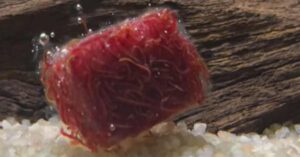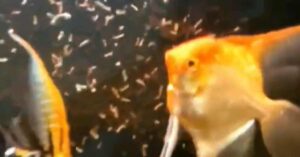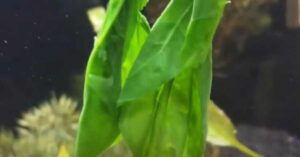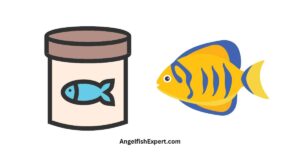Angelfish are beautiful and popular freshwater fish, known for their graceful appearance and active personalities. Providing your angelfish with a balanced and nutritious diet is essential for their health and well-being. In this article, we’ll discuss everything you need to know about feeding your angelfish, including their nutritional needs, feeding frequency, and the best types of food to give them.
Nutritional Needs of Angelfish
Angelfish require a balanced diet that provides them with all the essential nutrients, vitamins, and minerals they need to grow and thrive. Protein is essential for their growth and maintenance, while carbohydrates provide energy and fats support healthy cell function.
Feeding Frequency
It’s important to feed your angelfish small meals several times a day instead of one large meal. This helps them digest their food more easily and reduces the risk of overfeeding, which can lead to obesity and health problems.
Related How Long Can Angelfish Go Without Food and Water
Types of Food for Angelfish

There are several types of food that angelfish can eat, including flakes, pellets, frozen foods, live foods, and vegetables.
Best Food for Angelfish
Flakes and pellets

Flakes and pellets are convenient options that come in many varieties. Look for high-quality options that are specifically formulated for angelfish and contain a balanced mix of protein, carbohydrates, and fats.
Related Can Angelfish Eat Betta Pellets
Frozen foods

Frozen foods such as bloodworms, brine shrimp, and daphnia are high in protein and can provide a varied diet that keeps your angelfish interested and engaged.
Read in detail about Can Angelfish Eat Bloodworms and Can Angelfish Eat Brine Shrimp
Live foods

Live foods such as blackworms, earthworms, and mosquito larvae provide a natural source of nutrition and can help stimulate hunting behavior in your fish.
Vegetables

Vegetables like peas, zucchini, and spinach can provide important vitamins and minerals for your angelfish. Blanched veggies make for an easy and nutritious treat that can be added to their regular diet.
When choosing angelfish food, pay attention to the ingredients. Look for high-quality fish food that contains a variety of ingredients, including protein sources such as fish meal or krill, and plant-based ingredients like spirulina or algae. Avoid foods with fillers or artificial preservatives, which can be harmful to your fish.
Aim to choose a balanced diet that includes both flakes or pellets and live or frozen food options. Additionally, consider offering your angelfish occasional treats like blanched vegetables to provide them with added nutrition.
Tips for Feeding Angelfish

Here are some additional tips to keep in mind when feeding your angelfish:
Pay attention to the size of the food:
Angelfish have small mouths, so make sure the food you give them is small enough for them to swallow whole. If the food is too large, it can cause choking or digestive problems.
Monitor feeding habits:
Keep a close eye on how much food your angelfish are eating and adjust their feeding schedule accordingly. If they are not finishing their meals, reduce the amount of food you are giving them.
Don’t rely on one type of food:
While flakes or pellets may be convenient, it’s important to provide your angelfish with a varied diet that includes other types of food such as frozen or live foods.
Consider adding supplements:
To ensure your angelfish are getting all the essential nutrients they need, consider adding supplements to their diet. Vitamin supplements and probiotics can help boost their immune system and improve digestion.
That is why after doing so much research we have created a list of what your angelfish can eat and what can not
FAQs
Can angelfish eat other fish food?
Yes, angelfish fish eat other fish food but it’s not the best choice for their diet.
Do angelfish need special food?
Angelfish have specific dietary requirements that are different from other freshwater fish species. While they can survive on a general fish food diet, providing them with specialized angelfish food can help ensure their optimal health and development.
Specialized angelfish food is designed to meet the nutritional needs of these fish, which includes plenty of protein, vitamins, and minerals. High-quality angelfish food should contain protein sources such as fish or shrimp meals, as well as plant-based ingredients like spirulina or algae.
Some varieties of specialized angelfish food also contain added vitamins and minerals, which can help boost immune function and promote healthy growth.
What vegetables do angelfish eat?
Vegetables like peas, zucchini, and spinach can provide important vitamins and minerals for your angelfish. Blanched veggies make for an easy and nutritious treat that can be added to their regular diet. Be sure to avoid feeding your angelfish too many vegetables, however, as they still require a primarily protein-based diet.
Queen Angelfish Diet
The queen angelfish is a stunning species of marine fish that requires a varied and balanced diet to maintain optimal health. In the wild, their diet primarily consists of sponges, tunicates, algae, and small invertebrates. To replicate this diet in captivity, it is recommended to offer them a variety of foods such as mysis shrimp, brine shrimp, krill, and quality flakes or pellets formulated specifically for angelfish.
Conclusion
Feeding your angelfish a balanced and nutritious diet is essential for their health and well-being. By following these tips, you can keep your angelfish healthy and happy for years to come.